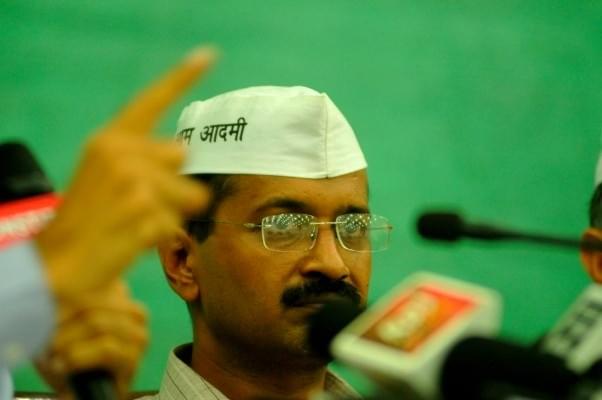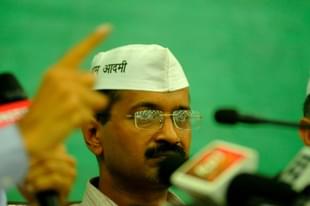Politics
Why Arvind Kejriwal Is The Worst Thing To Have Happened To Indian Politics This Decade
Mayuresh Didolkar
Feb 21, 2018, 01:40 PM | Updated 01:40 PM IST
Save & read from anywhere!
Bookmark stories for easy access on any device or the Swarajya app.


In 2013, in the aftermath of the stunning electoral debut of Aam Aadmi Party (AAP) in the Delhi assembly elections, a Mumbai-based friend and AAP supporter told me at the time, “Remember Nayak where Amrish Puri offers the chief minister’s post to Anil Kapoor for a day? This election was that. You will see. The outsider (Arvind Kejriwal) will change the politics from within.”
I didn’t agree with him then, and what’s transpired over the four-odd years since the Arvind Kejriwal-led AAP party took over the national capital’s assembly has largely proven me right. And yet, the full impact of the dumpster fire of the AAP regime has not been felt fully.
I have had my reservations about Kejriwal and his brand of politics since his India Against Corruption days, but it is only now that I appreciate the corrosive impact this man has had on Indian politics. And while his film reviews, his change of ministers based on upcoming elections, and his samosa bills have all provided steady fodder to social media comics, I fear the joke is largely on us.
Here is why I make the case that Kejriwal has forever changed Indian politics for the worse.
1. End of innocence
Kejriwal’s spectacular implosion on the national stage has destroyed optimism about activist leadership emerging out of nowhere to lead the nation. The educated, idealistic Indian Administrative Service officer changing a corrupt, corroded system has been among the favourite story lines in popular culture. In real life too, we looked more favourably upon people in public life if they were trained at the top institutions or selected in one of the most competitive examinations of independent India. Well, no more.
Worse, anyone with more than a casual interest in the AAP movement would know of at least one person who left their cushy corporate job to take the plunge into politics on the basis of the story sold to them by Kejriwal. Many such people have already left AAP and yet in some ways feel like “you can check out any time you like but you can never leave”, like in the popular Hotel California song. It neither lets them return to the careers they left behind, nor does it let them pursue their dream of bringing about change in society. This generation of educated, disgruntled, unconnected people haunting the hallways of social media and their perpetual disillusionment with India have largely to do with personal betrayal by one person. It is on you, Mr Kejriwal.
2. Mainstreaming the activist-hooligan nexus
The politician-goonda nexus has been around for as long as Independent India has existed, and yet it is somehow more chilling to see a party which was floated with the express purpose of eradication of corruption, actively encourage and integrate the kind of hooliganism repeatedly demonstrated by AAP leaders in Delhi in the last three years. Whether it is the drunken member of Parliament compromising on Parliament’s safety, or the shameful thrashing of a secretary-level employee in the presence of the Chief Minister and Deputy Chief Minister, AAP leaders and supporters alike have been lowering the bar for law abidance with a brazenness that is frightening, to say the least.
3. Activist-extremist nexus
Equally worrying has been AAP’s courting of extremist elements for the sake of votes. Let me explain why this is more worrying than a similar stance taken by, say, the communist parties or regional outfits. From time to time, we have seen regional parties supporting extremist elements (Punjab and Tamil Nadu, for example). We have also seen ideologies, like communism, being more receptive to the idea of intimidation and violence than others. In AAP’s case, however, the party is neither a regional outfit (in terms of its genesis) nor is it founded on the principles of an ideology like communism, explicitly. What the party, with encouragement from Kerjiwal, has done is to form alliances with almost every single extremist element in each region. From fielding a candidate like Soni Suri from central India to describing the Batla House encounter as fake to its forays into the Khalistani movement, AAP has built alliances not on the basis of ideology, however misplaced, but on calculations aimed at electoral politics and funding.
When the party was founded, people spoke about finally cleaning up politics and raising the standards. If anything, on this count, AAP has lowered the bar considerably.
4. Narcissism before governance
As bad as AAP’s policies have been, they pale in significance when compared to the rapid fall in perception of Kejriwal since December 2013. When I first read about Kejriwal and saw him on television, my fears were more about zealotry and disregard for due process. Since taking over the premiership of Delhi, Kejriwal has proven himself to be a petty, unfocused narcissist who lives for the next dopamine hit through Twitter wars. Whether it is the laughable amount of time spent watching and reviewing new films, or his responses to the defamation suit brought on by Union Finance Minister Arun Jaitley, Kejriwal seems to epitomise the corrupt, lazy bureaucracy he proclaimed to fight once but of which he merely seems to be a product.
One of the reasons why his tenure has been such an unmitigated disaster is the fact that while nearly every chief minister has a national ambition, no other incumbent has so little time for the job of running the state as Kejriwal seems to have. His narcissism has not allowed him to settle into the role of a regional leader, and while chief ministers like Devendra Fadnavis, Captain Amarinder Singh, and Nitish Kumar have set examples of performance, Kejriwal has looked upon his responsibility as nothing more than a title to include in his Twitter bio. Delhi has paid the price for it as a result.
5. Destruction of state-level activist base
During their ill-advised 2014 Lok Sabha campaign, AAP went in search of civil activists in each state and indiscriminately distributed tickets without considering if the party had the financial wherewithal and the distribution capabilities to support such a large-scale campaign. Predictably, AAP failed to win any seat outside Punjab. More importantly, many of those candidates (Subhas Ware of Pune is one example) quickly became disgruntled and moved away from the party. The individuals, some of them earnest, motivated individuals, will carry the 2014 result as a humiliating black mark on their judgement for the rest of their lives. Had it not been for Kejriwal’s monstrous ego that fuelled the dream of taking on the Bharatiya Janata Party (BJP)-Rashtriya Swayamsevak Sangh (RSS) machinery nationwide, none of this would have been necessary. The 2014 election was the scorched-earth campaign that neither achieved its objective (defeating the BJP) nor helped the party build a nationwide presence.
6. Mainstreaming the victimhood/cry-bully narrative
Whether you take the example of Kejriwal’s endless tussles with former Delhi lieutenant governor Najeeb Jung, or the defamation lawsuit filed against him, playing victim has been a go-to move for the Chief Minister. From Delhi’s numerous infrastructure issues to promises his party had made in their manifesto to come to power, Kejriwal and his team have always had ready an excuse and a villain (mostly someone from the BJP or acting at the behest of it). What Kejriwal has failed to grasp is that in electoral politics, people hate weakness almost as much as corruption. While the effect of this attitude is sure to be seen in the party’s electoral fortunes in the days to come, Kejriwal has polluted Indian politics forever by demonstrating that you could evade responsibility by simply claiming persecution. With the cry-bully culture already gaining a toe-hold among the millennials, an electorally successful politician watching films and taking weeks-long sabbaticals from his job while blaming someone else for his failures is a bad role model to have. The overall narrative of pessimism (“sab mile hue hain ji”) that Kejriwal has perpetuated, stands in sharp contrast to the narrative of optimism set by leaders like Narendra Modi and Chandrababu Naidu.
Only time will tell where the AAP experiment goes from here. But this is for sure – over the short span of half a decade, Kejriwal and his supporters have taken something that the masses were already short on confidence about and plunged it even deeper. In the years to come, public scepticism about Indian politics will continue to touch new heights, and AAP and its disastrous tenure in Delhi will have a disproportionately large role in this sentiment. It is ironical because as a political party, AAP, even if it survives, is unlikely to leave a footprint in policy or governance, and yet any discussion about Indian politics, say, 20 from now, would be impossible to have without mentioning them.
The band of young men who conspired to assassinate Archduke Franz Ferdinand in 1914 sparked a global conflict through their actions. Yet, as individuals, they were in all probability petty reactionaries who did not understand the implications of their actions. I’m afraid AAP and Kejriwal will forever be like those Serbian assassins for Indian politics.
The writer is a investment services professional and novelist. His latest novel The Dark Road was published by Juggernaut Publications.




